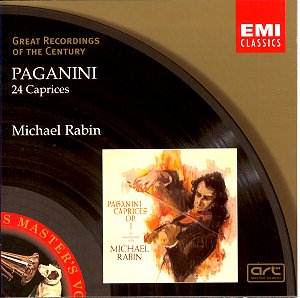This is an interesting inclusion in EMI’s GROC series.
They have chosen the present recording over the other obvious contender
from their archive, Itzhak Perlman’s highly praised version from 1972.
Having listened through the disc, I can only applaud their choice, for
whatever the Perlman’s merits, this is a very special document from
a very special performer.
To those of us keen on music generally, but not particularly
violin aficionados, Michael Rabin was as much a name referred
to by other violinists as anything. The fact that it was referred to
with the utmost respect, not to say awe in certain quarters, always
made me keen to hear what all the fuss was about, and this legendary
recording of the Paganini Caprices is the best possible memorial
to his art. It has been available before, but has surely now found its
true home in this series.
Rabin was born in 1936 into an intensely musical family.
His father was a long-serving first desk violinist with the New York
Philharmonic, and his mother a respected pianist who taught at the Juilliard.
His talent was obvious from the start, and he had a lot of high profile
early exposure, debuting at age 9 and even recording a number of these
very Caprices at the tender age of 12. He went on a punishing
schedule of tours in his twenties, embarked on a series of recordings
for EMI in the 1950s (of which this is one) and was effectively burnt
out by the 1960s. The critical acclaim cooled, the ill health that had
dogged him got worse, and there were even allegations of drug abuse.
The tragedy ended in 1972, when he died following a fall at his New
York home. He was 36.
Hearing him at the peak of his powers, in 1958, gives
one an idea why so much was expected of him. The technical control is
truly astonishing, and it is allied to a keen intellect and such a passion
for the music that criticism is almost useless. He is incapable of producing
an ugly tone, even in the most fiendishly difficult passages – and there
are many in these works. When Rabin made his recording, playing the
set as a whole was a fairly recent development. They were generally
given in small groups, played as encores, or even spiced up with piano
accompaniments. But they make excellent listening as a whole cycle,
such is the variety and marvellously dare-devil invention on display.
It needs a performance to match that invention, and Rabin revels in
the virtuosity. Examples abound throughout; indeed, every single piece
has something about it that makes you sit up and take notice, and Rabin’s
tonal palette and bowing ensure that monotony never sets in. Listen
to the fiery scale work of No. 5 in A minor and the way he copes with
the difficult turns in No.14 in E flat. This is a true master at work.
The set rounds off with another A minor, the most famous of the lot
and the piece that inspired a whole generation of composers (Liszt,
Brahms and Rachmaninov among them) to adapt it in various guises. It
makes a fitting conclusion to a stunning recital.
Recording quality is extremely good, with only a trace
of tape rumble and faint pre-echo to show its age. Informative notes
are by Tully Potter. There is much competition now in the catalogue,
with the above-mentioned Perlman, as well as Salvatore Accardo, Leonidas
Kavakos and Naxos’s excellent Ilya Kaler being highly praised. But Rabin
is special, and there can be no better tribute to one of the century’s
most gifted, and ultimately most tragic, musical prodigies.
Tony Haywood

